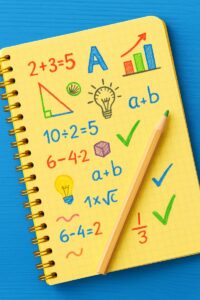Best Homeschool Math Curriculum: A Parent’s Guide to Choosing and Using What Works
Considering homeschool math? Start here. Whether you’re choosing your first program or switching mid-year, this guide will help you pick the best homeschool math curriculum for your child—and teach with confidence.
Choosing a homeschool math curriculum can feel overwhelming. Should you use a textbook? A video course? A hands-on or mastery-based program? Whether you’re just starting out or trying to fix what didn’t work before, this guide is here to help.
Below, you’ll find answers to some of the most common questions parents ask when navigating homeschool math. These insights are designed to equip you—so you can make decisions with clarity and confidence.
How do I pick the best homeschool math curriculum for my child?
The best homeschool math curriculum is the one that fits your child’s learning style, your teaching comfort level, and your family’s goals. Some students thrive with hands-on lessons and visual aids; others prefer written explanations and step-by-step logic. This guide walks you through how to evaluate different approaches so you can find the right fit—whether you’re starting fresh or making a mid-year change.
How do I know which level my child should be in?
Many homeschool math programs offer placement tests or sample lessons—but those aren’t the only ways to begin.
You can start by identifying areas where your child needs the most support. If fractions or long division are shaky, try a focused unit or workshop on that skill. Or start with an on-grade-level course and adjust:
- Move faster if the material is too easy. (Some families let their child complete every other problem and skip ahead after demonstrating mastery.)
- Slow down and add support when needed. Use worksheets, games, or unit studies to reinforce tough concepts.
- Use the Scope and Sequence as a checklist. Walk through concepts with your child and see what they’ve mastered—and what’s coming in future grades.
The beauty of homeschooling is flexibility. You don’t have to follow someone else’s pace—you can meet your child where they are.
What’s the difference between spiral and mastery approaches?
In short: a spiral program rotates through topics, revisiting them over time. A mastery program stays on one concept until it’s thoroughly learned.
- A spiral approach might introduce simple algebraic equations as early as grade 3, then revisit and expand on them each year.
- A mastery program may not introduce equations until Pre-Algebra, treating that unit as the student’s main preparation for Algebra 1.
Both approaches work. Spiral helps students retain concepts through spaced repetition. Mastery helps students focus deeply on one thing at a time. Some families even blend the two.
Do I need a video-based program to teach math well?
Not necessarily. The most important thing is how your child learns best.
Some students are visual and need video instruction to grasp the concepts. Others learn just fine with written explanations and practice. Some parents prefer video-based programs. Others prefer paper-based courses they can teach directly.
It’s okay if your comfort zone doesn’t match your child’s learning style at first. One mom shared that although she preferred textbooks and worksheets, her son needed video input—so she adapted to meet his needs.
At SchoolhouseTeachers.com, the parent is the teacher. We offer both text-based and video-supported math courses, with teaching helps and extension activities so you can guide your child, not hand them off to a screen.
How can I support a child who struggles with math?
First, know this: it’s not just your child. Many homeschool families hit rough patches in math.
Homeschooling lets you slow down, switch approaches, or even relearn the material together. Here are some ways to support your student:
- Sit beside them for one-on-one help and encouragement.
- Try a different curriculum or teaching method if needed.
- Trade services with a fellow homeschooler who’s good at math.
- Join a co-op or group class for added support.
- Pray for wisdom and patience—God created math, and He knows exactly what your child needs.
Want more encouragement? The Homeschool Minute article “When Math Brings Tears,” by Gena Suarez and Jodi Riddle of The Old Schoolhouse®, Carolyn VanGorkom of SchoolhouseTeachers.com, and Pat Murray of CTCMath. Each author shares practical ideas and personal stories for navigating math with grace.
What if my child is ahead or behind grade level?
One of the best things about homeschooling is that you’re not bound to grade-level expectations.
Some students need extra time and repetition before things click. Others fly ahead. Some even earn master’s degrees by 18 through early graduation and dual enrollment. One SchoolhouseTeachers.com family shared that their son wasn’t quite in that category, but he was still ready to graduate by December of his junior year—and math didn’t hold him back.
Homeschooling gives you the freedom to:
- Accelerate when your child is ready
- Pause or revisit topics as needed
- Focus on skills rather than rigid timelines
Homeschooling lets you build a math journey that fits your student, not the other way around.
Once you’ve found the right pace and approach for your child, it helps to have tools that support you as the teacher—especially if math wasn’t your favorite subject growing up. That’s where the curriculum structure and teaching resources at SchoolhouseTeachers.com come in.
Support for Every Teaching Style
You don’t have to be a math expert to teach math well. Our courses are designed to guide you, not overwhelm you. SchoolhouseTeachers.com supports families with flexible, Christ-centered math instruction for all ages
- All math courses include step-by-step lessons with answer keys.
- Select courses offer video instruction, printable activities, games, or concept-based workshops.
- Additional resources provide extra support for hands-on learners and students with special needs:
- The Math Center offers a curated collection of math courses and tools organized by concept, grade level, and learning style. Whether you’re looking for extra practice in a specific area or support as a parent, the Math Center makes it easy to find what you need, including featured resources like How to Teach Elementary Math.
- The Kinetic Connections resource provides tips and ideas for teaching through movement, hands-on activities, and play-based strategies.
- The Special Needs Center features expert- and parent-designed courses and resources. It also highlights audio-friendly, hands-on, and visual supports to help families adapt instruction to their child’s needs.
- The Hands-On Learning Center highlights courses with strong hands-on components across multiple subjects. It provides an easy way to find lessons that involve active, tactile learning—ideal for students who thrive through doing.
From our Math Center and teaching tutorials to Kinetic Connections and our Special Needs library, you’ll find help and encouragement at every stage.
Explore Our Math Courses and Resources
SchoolhouseTeachers.com offers a wide range of math options to support every stage of learning. You’ll find courses to cover every level from Shapes to Statistics.
Homeschool Math Curriculum by Grade:
- Over two dozen full math courses spanning PreK through Grade 12. (Browse our complete lineup of homeschool math courses.)
- Virtual school boxes for every grade take the guesswork out of what to teach when. (See the whole lineup from Pre-K – Grade 12.)
Skill-Based Math Units:
- Multiple Workshop and Game courses cover specific skills or extra practice.
- Unit studies focused on specific skills like fractions, decimals, and place value (Explore unit studies by subject; full details are accessible to members)
Parent Tools for Teaching Math:
- Bonus parent resources to equip you with teaching strategies, tips, and encouragement (See our teaching resources for parents.)
Whether you’re introducing numbers to a preschooler or guiding a teen through algebra, geometry, or even introductory calculus, our flexible approach lets you build a custom path that fits your student’s needs and your teaching style. (Yes, we even offer a first-year calculus course for advanced high schoolers—Intro to Calculus: Derivatives and Integrals, covering foundational concepts like derivatives and basic integration.)
Why SchoolhouseTeachers.com Works for Math
Can I switch math curriculum mid-year?
Absolutely. In fact, it’s one of the key advantages of using SchoolhouseTeachers.com.
If your child hits a roadblock—or outgrows the current level—you don’t have to wait for a new term or buy a whole new program. Your membership includes access to all math courses at every grade level, so you can:
- Try a different format (video vs. text-based)
- Move up or down a grade as needed
- Add a focused unit study to reinforce key skills
There are no per-course fees and no penalties for switching tracks. You have the freedom to adapt your math plan anytime—without extra cost.
Do I have to pay extra for additional students?
No. One of the greatest benefits of SchoolhouseTeachers.com is that your entire family is covered under one membership. Whether you have one child or six, every student can access every course—including all math levels. This makes it easy to teach multiple ages at once, revisit earlier concepts with a younger sibling, or let an older student move ahead.
How does this help my child get ready for high school math?
We’re intentional about laying a strong foundation. Our elementary and middle school courses focus on essential skills like place value, operations, fractions, and problem-solving—without rushing into abstract concepts too early.
When students are ready, they can move into structured Pre-Algebra and Algebra courses, then continue with Geometry, Algebra 2, Trigonometry, and even Intro to Calculus.
How do I prepare my teen for high school math?
Homeschooling high school math can feel intimidating—but it doesn’t have to be. The key is to build a strong foundation and choose courses that guide both the student and the parent.
At SchoolhouseTeachers.com, we support families by:
- Offering step-by-step courses in Pre-Algebra, Algebra 1, Geometry, Algebra 2, and beyond
- Including answer keys and clear instructions so parents can guide—even if it’s been years since they last solved for x
- Providing unit studies and foundational workshops to shore up any gaps before moving forward
- Equipping you with lesson plans, record keeping tools, and planning resources to stay on track
- Whether your teen is college-bound or exploring a different path, you can build confidence and skills at home—with curriculum that adapts to your family’s pace and priorities.
How far should my student go in high school math?
That depends on your student’s goals, strengths, and pace.
Reaching Intro to Calculus by graduation is a remarkable accomplishment—usually possible only for advanced students who progressed quickly through elementary math, skipped Pre-Algebra, and tackled high school-level courses early with consistency and focus.
For the average student, completing Algebra 1, Geometry, Algebra 2, Trigonometry, and/or Statistics represents a strong high school math education—one that prepares them for a wide range of college majors and career paths.
And for the student who isn’t math-inclined? Algebra 1 provides plenty of math exposure for most adult professions, while Geometry in Real Life helps build logical reasoning and real-world application skills. Not every student needs Calculus—and that’s okay.
The right path is the one that supports your student’s calling, confidence, and next steps.
Why Choose SchoolhouseTeachers.com?
When you become a member, you get more than just math. You get access to:
- Hundreds of courses across every core subject and grade level (PreK–12)
- One affordable membership that covers your entire family
- No per-course or per-student fees
- Christ-centered content across all subjects
- Teaching support and tools, including lesson plans, record keeping, transcript help, and parent resources
- Flexibility to switch courses anytime as your child’s needs change
Whether you’re teaching one child or several, just starting out or preparing for graduation, SchoolhouseTeachers.com gives you the tools to homeschool with confidence.
Ready to Take the Next Step?
If you’re looking for a math program that fits your family—academically, spiritually, and practically—SchoolhouseTeachers.com is here to help.
- Browse our Math Courses
- Join SchoolhouseTeachers.com
- Want to stay organized? See how ST supports homeschool record keeping.







